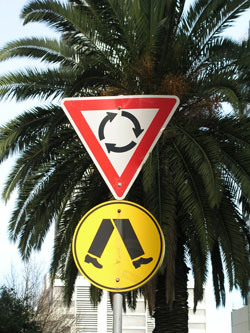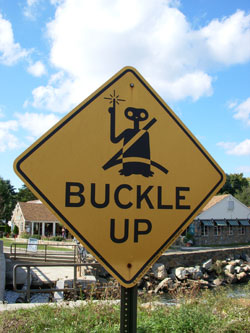YMMV (2012)

About a year ago I wrote an article called “Your Mileage May Vary”, in which I recounted the story of a good friend of mine who took something that was represented to her as “ecstasy” and then ended up suffering an apparent stroke during the resulting experience. At the time that the original version of this article was written, my friend was still in the hospital with unknown prospects, and I was sort of anguishing over having personally recommended MDMA for her consideration.
I knew that my friend was a big girl, fully capable of doing her own research and coming to her own decisions. I still felt like complete shit, though. I couldn’t remember exactly what I’d said to her about it, but I was statistically certain that I had made it sound too good to be true–waxing eloquent about the wonders of transcendent self-discovery and emotional bonding in pill form, without ever really going into too much detail about the possible perils and pitfalls. I particularly regretted (and still regret) that I didn’t bother to mention that many pills sold as ecstasy these days are dubious at best, and that only some of them turn out be pure MDMA.
I felt so bad, in fact, that for a while I honestly thought that I was going to quit writing about drugs forever. And I did end up taking more than a year off. Maybe you noticed. I’m coming back, though, because after a whole lot of soul-searching I’ve decided that it really is critically important to keep raising awareness about the awesome power and potential of psychedelic medicines.
Whenever we discover something truly amazing, we naturally want to tell others about it. It’s probably part of the software suite associated with pack survival. We gain social capital when we introduce people to things that later become important to them. Also, your whole team (I think of the entire human race as my team) gains some advantage whenever any of its members take on an adaptive behavior. Maybe that’s part of why I’ve always loved introducing people to certain psychedelics. There’s sort of a rush associated with being the one who gets to provide somebody with something that they’ve been trying to manifest for a long time, and it’s an honor and a privilege to witness other people’s most profound and intimate experiences. I used to be really into it, actually. Way back when I was a homeless neo-hippie festival-hopping street kid, I totally went around with various rockets in my pockets. I ended up having a rather curious series of psychospiritual one-night stands in which I’d meet a single-serving friend on the trail somewhere and take him back to his tent for a little ten-minute freefall down the rabbit hole. Just whiz blur, thank you, sir! — and off again into the night to look for other minds to blow (she says glibly, and then reconsiders that phrase with a shudder). At the time of these events I was absolutely convinced that this practice was not only entirely ethical but something along the lines of a sacred duty that I had been especially selected and trained to perform. I had every confidence in the world that I was doing a very good deed by opening these people up to a larger truth that they had an inalienable right to know about; I figured that however they chose to react to that knowledge was up to them and essentially none of my business. Fortunately the Force was with me, and my little ministry was almost uncannily blessed with unanimously triumphant outcomes. It nevertheless feels wildly irresponsible to me in retrospect. What seemed like the true courage of the mystic libertine fifteen years ago now reads in my memory rather more like recklessness, and my “selfless service” stands revealed in the cold clear light of hindsight as having been more than a little bit motivated by ego.
Yet I really am super glad that somebody had the courage to introduce me to my favorite substances. And I’m grateful that I had more than just Nancy Reagan’s opinion on the matter to consider when it came time to make those big decisions. Indeed, psychedelic evangelism has played an important part in the history of consciousness exploration, and I daresay in the history of the world at large. I’ve always resonated with the Prankster ethos, and I count Timothy Leary amongst my many personal heroes. Faced with the burden of arcane knowledge and the glimmer of evolutionary opportunity, I can see why folks who happen to be in the know would want to spread the good news far and wide. But the “dose ’em all and let God sort ’em out” approach is doubly irresponsible at this point in the game, because it endangers both the individuals involved and the tenuous and grudging respect that the psychedelic movement at large has painstakingly managed to achieve through careful hard work and dogged persistence.
So where does that leave people like me? My enthusiasm for the topic is obvious and contagious. Is it more wrong to write about the wonders of psychedelics than it is to proselytize about how fun it is to go snowboarding? How would you feel if your words inspired somebody out there to take up, say, mountain climbing and that person later fell off of a cliff and broke her leg? If that’s different, then why is it different? This is the question that has haunted me all year long. Is there such a thing as responsible advocacy, or even merely the responsible dissemination of positive information where drugs are concerned? And if so, what does it look like?

For one thing, we have to remember to be upfront about the dangers of experimentation. Taking drugs always involves some risk. Period. It might seem like this goes without saying, but I think that it’s important to keep on saying it all the same. Given a substance of known quality and a positive set and setting, I think a healthy volunteer is about as safe taking a mild amount of a psychedelic drug as he would be if he attempted (with some training) to ride a motorcycle stone-cold sober. On the other hand, most of my friends who ride motorcycles have been in at least one accident. I don’t think this means that motorcycles ought to be prohibited. I don’t think it should be illegal to sell motorcycles. And I don’t think it’s particularly irresponsible to talk about how much fun they can be to ride. Lots of wonderful stuff is a little bit risky. It pays to educate yourself about the specific hazards inherent to whatever it is that you’re into, though, so that you can make informed choices and take the necessary precautions. Like wearing a helmet, for instance. Or having a sitter. We have to tell the whole truth. We have to present a balanced picture. Even tested, approved, and properly prescribed pharmaceuticals can be potentially lethal in a small percentage of patients, and the manufacturers have to list the known side effects on the packaging even if they’re vanishingly unlikely to happen to any one particular person. The law requires such labeling for a good reason. It’s important to remind consumers that everybody is different in order to prepare them for unexpected outcomes, in case they turn out to be the rare exception.
When you recommend a drug to someone, you’re taking on some serious karma. It might not happen on their maiden voyage, but there is always a small chance that a person who becomes interested in certain drugs will eventually end up getting hurt, or addicted, or they’ll try to buy something from a cop, or they’ll trigger a latent psychological issue that they’ve been suppressing, or they’ll start believing that they’re the reincarnation of an Egyptian deity, or they’ll fail a piss test and get fired from their job. Or something even worse could happen. I’m not saying that any of those things would be the fault of the person who started the ball rolling, but it’s worth thinking about them before you start rhapsodizing about bliss and enlightenment.
Those who actually supply drugs to others take on an even heavier burden. I feel that suppliers should be obliged to find out whatever they can, and to pass on whatever they learn. Where did a substance come from? How strong is it? How certain is the identity? Is it habituating? Did the supplier try it personally, and if so what was the experience like? Suppliers need to make clear what they DON’T know, too, and point folks to information resources so that they can do their own research. Anyone who says some crappy back-alley ecstasy is pure MDMA (in order to look good or to close a sale) totally sucks, and they deserve what they’re going to get someday. Believe it.
You may think that you’re the Trickster’s darling, but the tides of fortune can turn real fast, believe you me. Shit happens. I’ve been attacked by a trip buddy. I’ve gotten horribly sick. I’ve been busted. I’ve ended up in the hospital. And I’ve felt like I was being torn apart in all nine levels of Hell simultaneously for a billion years compressed into every second of what we’re pleased to call “real time”. I’ve had trips so bad that I can’t even think about them properly, much less write about them. Some of the most intense memories seem to be repressed now, or were always somewhat inaccessible, and I sometimes wonder exactly how terrific for me that is. I’ve had software updates installed that I could not possibly have consented to before I knew what it was going to be like to think differently. (Fortunately for me, I feel like I would have chosen most of the ways that I’ve been changed, but that’s entirely beside the point.)
I’ve been changed quite a bit, actually. I think about a lot of weird stuff that I didn’t use to think about. Some of it is very interesting. Some of it is challenging in the extreme. I don’t think that my short-term memory is as good as it used to be, though that might just be me getting older. I have a couple of friends with mild Hallucinogen Persistent Perceptual Disorder. I have friends who were more comfortable with their spiritual viewpoints back before they had what they themselves would consider to be full-blown spiritual experiences. I’ve lost hundreds of hours worth of productivity because I smoked way too much pot. And who knows what all the new and newish psychedelics will end up doing to their users in the long run? Same goes for pharms, of course. (And Twinkies!) It’s a calculated risk, just like everything else. It adds up, though, and you increase your odds of an unwanted outcome if you take more drugs, or if you take drugs for a longer period of time, or if you mix things. Sometimes people die just because they get a little bit sloppy and forget to follow the basic ground rules. Sometimes people do everything exactly right and they still die anyway. It happens on the freeway all the time. We still drive. But we fasten our seat belts, or we ought to.
I’m not laying out all this scary stuff to try to convince anyone not to take drugs. Heck, the fact that I’m still interested in devoting a lot of my attention to psychedelics in light of everything that I’ve been through is a more impressive testament in their favor than anything I might be able to offer up if I had only experienced their more pleasant and salubrious effects. I mean, I must be getting something pretty fantastic out of my practice for it to be worth all of that risk and hassle to me, right? It’s not that I want to scare people. Fear is the mind-killer, and all that. Once you’ve committed to taking a drug, you can’t afford to sit around thinking about all the things that could go wrong. You have to put all that out of your head and relax. Blind or exaggerated fear is actually part of the problem, because it keeps us from thinking about these things in a clear and practical way. I think scare campaigns about drugs are sort of like abstinence-only sex education crusades; if kids feel bad about even researching the matter, they tend to make poorly informed choices about the proscribed activity when they eventually do yield to their natural curiosity.
I teach people to dance with fire and I recommend it to almost everyone I meet. It’s a great meditation and self-transformation practice, as well as being a fun and sexy performance art. It’s also kind of dangerous. It’s probably less dangerous than SCUBA diving, though, and my first fire class is all about how to avoid getting burned and how to put yourself out if you do happen to catch on fire. So far none of my students have had anything really bad happen (knock on my wooden head). I do know there is always a chance that something could go wrong for one of them some day, either through their own error or because of tool failure, but it doesn’t exactly keep me up nights. Maybe it’s because I spend so much time going over the potential risks and mitigating them by installing a working understanding of best practices. A fire dancer must carefully cultivate a healthy respect for fire. Not fear, exactly, but a keen awareness that focuses the mind and makes the dance more graceful. Occasionally, people do get burned. Sometimes it’s because they were careless. Sometimes it just seems like their number came up. It’s the same with surfing, or skateboarding, or driving a car. Life is dangerous. It’s going to kill us all eventually, in fact. It’s up to each of us to decide which experiences are worth the risks that they carry, both for ourselves and for our loved ones.
As of this writing, my friend who had a stroke last year is doing much better. She walks and talks and drives and hangs out with her friends and all that. She’s developing a novel hula-hoop based therapy that may someday help other people with bilateral coordination problems. For the most part, she seems pretty happy. I can tell that she’s not the same, though. I just called her up and asked her how she feels about me writing for Erowid again, and she was unexpectedly supportive. She said that I should be proud of who I am and what I do, and she thinks that I should continue the good work in spite of everything. But she also sees it as a chance to become a more powerful advocate for keeping one’s eyes open, and I find that I really resonate with that these days.
That’s one of the reasons Erowid exists. I happen to know about a few times that they’ve delayed posting experience reports for a new substance because they had nothing but positive descriptions of the effects, and they wanted to wait until they had the corresponding cautionary tales that they suspected would eventually come in. There is an honorable way to spread the good word, and that way is to provide people with high quality data and resources so that they can sort it out for themselves and make informed decisions. So please take the time to do your homework, and always tell the truth the whole truth and nothing but the truth (at least as far as you’re able to discern it). Don’t curb your enthusiasm, but do remember to temper it with a healthy dose of respect, especially when you’re talking with those who are just starting to get excited about exploring. I do think, in the end, that most people would benefit from having at least one psychedelic experience to broaden their perspective. But the person standing in front of you is never “most people”. She’s an individual with her own chemistry and her own set and her own unique opportunity; and she needs to be told that her mileage may vary.


